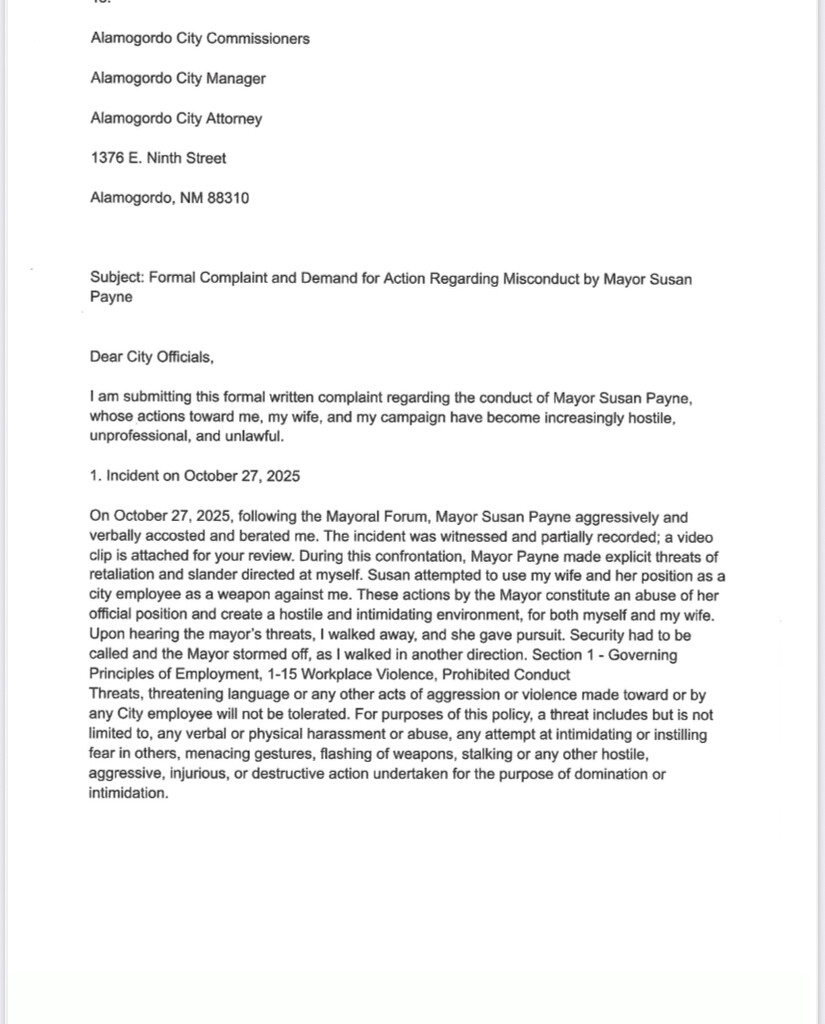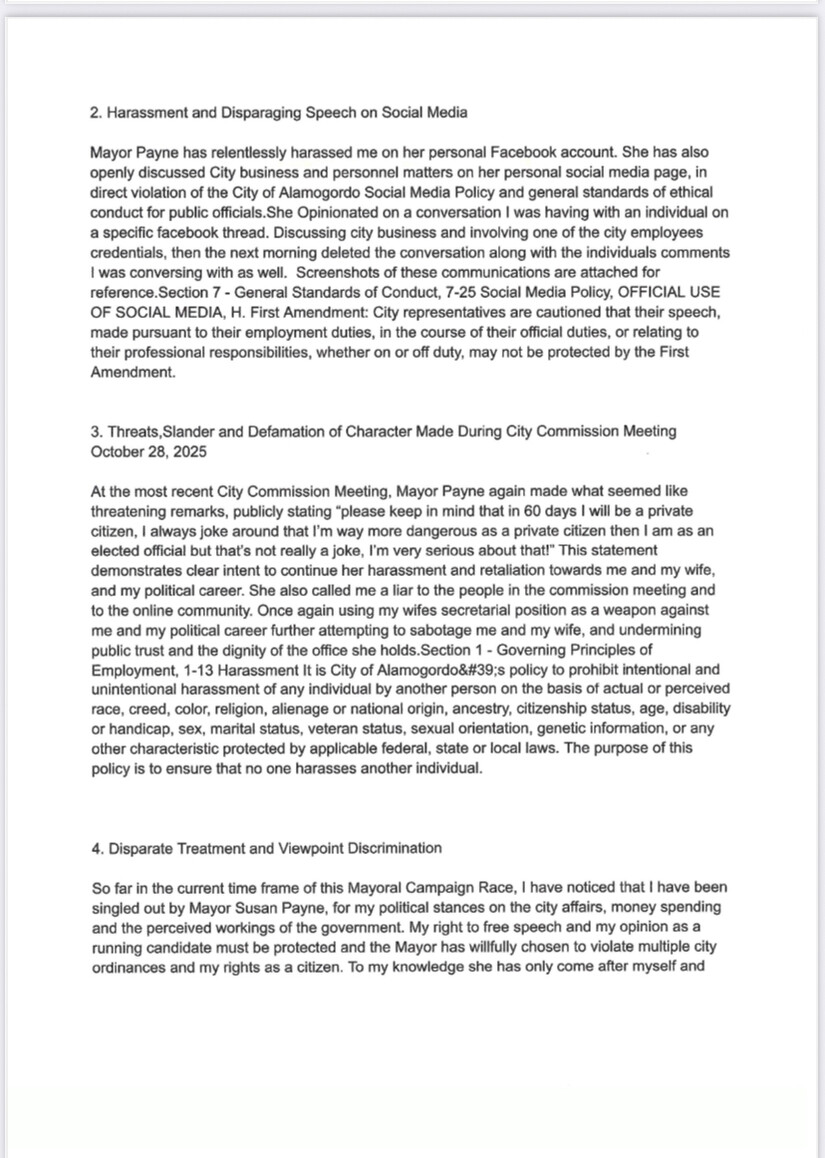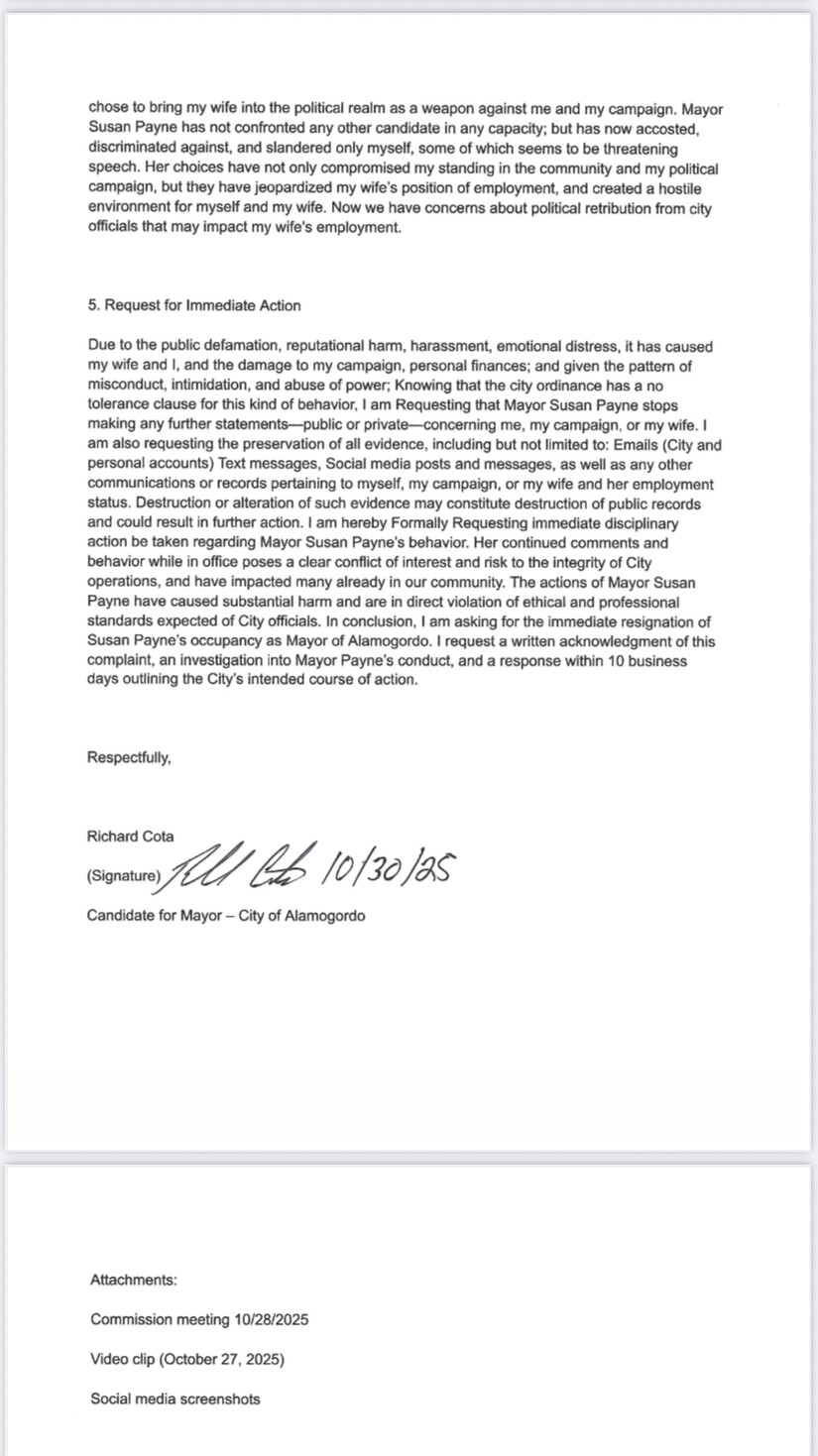Image


As Alamogordo’s municipal election nears, the race for mayor has taken a dramatic and contentious turn.
Mayoral candidate Richard Cota, one of five contenders in the November 4 election, has filed a formal complaint demanding the immediate resignation of Mayor Susan Payne.
The complaint, obtained by AlamogordoTownNews.org and KALHRadio.org via a public records request, accuses Payne of harassment, defamation, and threats stemming from a heated exchange at a candidate forum and subsequent comments made during a city commission meeting.
The Forum Flashpoint
The controversy began at the October 27 candidate forum hosted by Alamogordo News, where candidates were asked about nepotism and conflicts of interest. Front-runners Sharon McDonald and Latanya Boyce stated they had no conflicts. Jason Baldwin, a city-employed golf pro, acknowledged his role and pledged to recuse himself from votes involving the city-owned golf course. Candidate Morgan appeared uncertain, while Cota responded “no,” prompting visible reactions from the audience.
Mayor Payne, who attended the forum as a citizen, approached Cota afterward. A video posted to Facebook by Cota shows Payne shaking Cota’s hand and speaking with him. Cota then appears to walk away abruptly, and Payne follows ip the ramp and out the door. A voice—identified by attendees as Commissioner Burnett’s wife—calls out for security at the end of the video dramatically claiming, “Security, the mayor is accosting a mayoral candidate.” No physical contact occurred, and Payne exited the building immediately thereafter
The Complaint and Commission Comments
In his complaint letter dated October 30, Cota accuses Payne of “harassment and disparaging speech on social media,” “threats, slander and defamation of character,” and inappropriate conduct during public meetings.



He demands that Payne cease all commentary about him, his campaign, or his wife—who works in the Alamogordo city clerk’s office—and calls for the preservation of all related communications. The full letter is available here.
At the October 28 city commission meeting, Payne addressed the incident during commissioner comments. Without naming Cota directly, she criticized statements made by “a candidate” regarding conflicts of interest and the city’s relationship with Holloman Air Force Base. She noted that Cota’s wife is “the first person you see when you walk into City Hall, it’s not a secret.”
Payne admitted to raising her voice due to the crowd noise but defended her actions:
“I apologize for being loud,” she said. “I do not apologize for speaking to him because I am a voter.”
Asked by Alamogordo News to respond to the complaint, Payne said:
“I think the only person being harassed is me, but I can handle it, I’m not whining.”
“I don’t understand what his complaint is. It’s in my opinion not a valid complaint, but that’s for our attorney to decide.”
A Tense Interview with the Press
The controversy spilled into media coverage when Cota appeared on KALHRadio.org’s streaming edition of the Alamogordo Town News with host Anthony Lucero
During the interview, Lucero pressed Cota on his ability to handle public scrutiny and criticism. Cota responded sharply.
Lucero emphasized the role of media in holding all candidates accountable, prompting further pushback from Cota. The exchange raised questions about Cota’s temperament and readiness for public office.
The full interview is available here.
Public officials and political candidates face a significantly higher legal threshold when attempting to prove slander or defamation in court. They must demonstrate “actual malice”—a demanding standard that protects free speech and robust public debate.
In U.S. defamation law, individuals "who hold public office or seek election" are considered public figures, and as such, they must meet a more rigorous standard to prevail in a defamation lawsuit. Also in that respect is a "limited-purpose public figure" which is someone who has become a prominent figure in a particular topic or area such as a leader of a publicly active nonprofit organization, a chamber of commerce board member or executive director or a business leader vocal in community outcomes.
This principle was established in the landmark 1964 Supreme Court case New York Times Co. v. Sullivan, which introduced the “actual malice” standard for public officials.
What Is “Actual Malice”?
To succeed in a defamation claim, a public figure must prove that the allegedly defamatory statement was made:
• With knowledge that it was false, or
• With reckless disregard for whether it was true or false.
This means that it’s not enough for the statement to be damaging or incorrect.
The plaintiff must show, by clear and convincing evidence, that the speaker either knew the statement was false or seriously doubted its truth and published it anyway.
Why Is the Standard Higher?
The rationale behind this elevated threshold is rooted in First Amendment protections. The Supreme Court emphasized that public discourse must remain “uninhibited, robust, and wide-open,” especially when it involves criticism of government officials or candidates or those in the public trust.
Without this protection, the threat of defamation lawsuits could chill free speech a free press and discourage media and citizens from engaging in open debate.
Public officials are also presumed to have greater access to media and public platforms, allowing them to respond to criticism and defend their reputations more effectively than private individuals.
Cota's Assertion and the Implications for Political Campaign for Alamogordo Mayor.
During election seasons, political speech—including sharp critiques and controversial claims—is considered core protected speech. Courts generally view campaign rhetoric as opinion or hyperbole unless it involves provably false factual assertions made with actual malice.
Statements like “Candidate X is corrupt” or “Mayor Y is incompetent” are typically seen as opinions, not defamatory facts. However, if someone falsely claims, for example, that a candidate committed a crime and does so with reckless disregard for the truth, that could meet the actual malice threshold.
Summary
Public officials and candidates must prove actual malice to win a defamation case.
Opinions and political speech are highly protected, even if unpleasant or critical.
The burden of proof is high, requiring clear evidence of knowing falsehood or reckless disregard.
While front-runners McDonald, Baldwin, and Boyce have remained focused on policy and community engagement, Cota’s complaint and media clashes have added a volatile layer to the race. The incident has sparked debate over the role of incumbents in campaign discourse, the boundaries of mayoral conduct, and the tension between candidates and the press.
With early voting underway and the final vote on Tuesday, Alamogordo voters are left to weigh not only policy platforms but also the character, professionalism and conduct of those seeking to lead.
Sources:
Cota’s Complaint Document
Facebook Video of Forum Incident
•KALH Radio Interview with Richard Cota
Alamogordo News Mayoral quote
Full Complaint Letter IPRA request
UC Berkeley School of Law Library Resources
Note: Chris Edwards and Anthony Lucero special political reporting for AlamogordoTownNews.org and KALHRadio.org with research via 2nd Life Media associate Mica Maynard.
Yep, Cota is not ready for a public office let alone a Mayor.
Any chance Anthony Lucero would interview Ted Morgan?
Good ol Susan Payne. True to form.
Good ol Susan Payne being Susan Payne.
Perhaps I missed it in the news story, but Mr.Cota was mentioned in this sentence: "Candidate Morgan appeared uncertain, while Cota responded 'no,' prompting visible reactions from the audience." What is Mr. Cota's conflict of interest? Just a voter, wondering what caused the visible reactions. Thank you.
His wfe is the adminstrative assistant to the clerks office and the commissioners so he just should have disclosed as a possible conflict. See our news story it gives specifics and interviews
Thank you, sir, for your response. Does the fact that she is an employee of the city, he would have to recuse himself from anything regarding the city due to her employment? I understand he should clarify that his spouse works at the city, but is that a conflict?
I did read she was "the first person you see when you go to the city hall" by the Mayor. I guess (a smidge of sarcasm) I was confused about her identity, since the first person you may see at the city hall is a bit scarce due to weird hours (closed for lunch, when the public can go) at the windows for water.